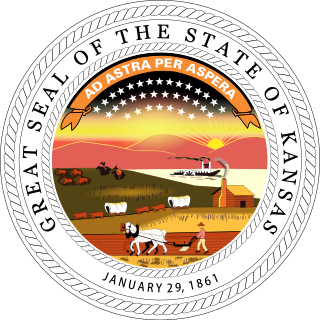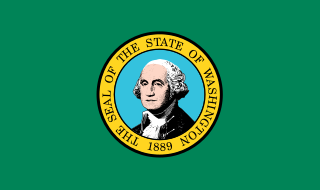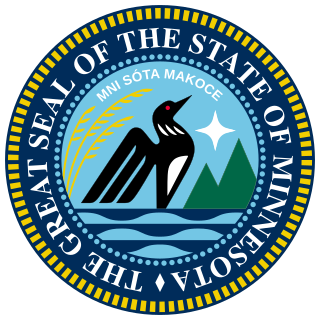
The Sauk or Sac are a group of Native Americans of the Northeastern Woodlands, who lived primarily in the region of what is now Green Bay, Wisconsin, when first encountered by the French in 1667. Today they have three federally recognized tribes, often together with the Meskwaki (Fox), located in Iowa, Oklahoma, and Kansas.

Darrington is a town in Snohomish County, Washington, United States. It is located in a North Cascades mountain valley formed by the Sauk and North Fork Stillaguamish rivers. Darrington is connected to nearby areas by State Route 530, which runs along the two rivers towards the city of Arlington, located 30 miles (48 km) to the west, and Rockport. It had a population of 1,347 at the 2010 census.

The Great Seal of the State of Kansas tells the history of the U.S. state of Kansas.

The Sauk-SuiattleIndian Tribe is a federally-recognized tribe of Sauk people located in western Washington state. The tribe historically lived along the banks of the Sauk, Suiattle, Cascade, Stillaguamish, and Skagit rivers, in the area known as Sauk Prairie at the foot of Whitehorse Mountain in the North Cascade Range.

The flag of the state of Maine features Maine's state coat of arms on a blue field. In the center of a heraldic shield, a moose rests under a tall pine tree. A farmer and seaman are meant to represent the traditional reliance on agriculture and the sea by the state. The North Star is intended to allude to the state motto: dirigo.

The flag ofthe state of New Mexico, also referred to as the New Mexican flag, is a State flag, consisting of a sacred red sun symbol of the Zia tribe on a field of gold (yellow). It was officially adopted in March 15, 1925 to highlight the state's Indigenous and Hispanic heritage: It’s a combination of the symbol of Puebloan people, who have ancient roots in the state, with the colors of the flag of Spain, to symbolize the Spanish empire, which had established and ruled over “Nuevo México” for over two and a half centuries.

The flag of Washington consists of the state seal, displaying an image of its namesake George Washington, on a field of dark green with gold fringe being optional. It is the only U.S. state flag with a field of green as well as the only state flag with the image of an American president. The secretary of state regulates flag protocol related to the state flag, as well approving replica flags for commercial sale and other standards related to the flag.

The Eye of Providence or All-Seeing Eye is a symbol depicting an eye, often enclosed in a triangle and surrounded by a ray of light or a halo, intended to represent Providence, as the eye watches over the workers of mankind. A well-known example of the Eye of Providence appears on the reverse of the Great Seal of the United States, which is depicted on the United States one-dollar bill.

The Skagit River is a river in southwestern British Columbia in Canada and northwestern Washington in the United States, approximately 150 mi (240 km) long. The river and its tributaries drain an area of 1.7 million acres (690,000 hectares) of the Cascade Range along the northern end of Puget Sound and flows into the sound.

The Sauk River is a tributary of the Skagit River, approximately 45 miles (72 km) long, in northwestern Washington in the United States. It drains an area of the high Cascade Range in the watershed of Puget Sound north of Seattle. The river is a popular destination for fly fishing. It is a National Wild and Scenic River.

The municipal flag of Cleveland serves as the representative banner of the city of Cleveland, Ohio, United States. The flag was designed by local art school graduate Susan Hepburn, and was officially adopted as the municipal banner by Cleveland City Council on October 21, 1895, with the ordinance on the flag adopted on February 24, 1896.

The Circassian flag is the national flag of the Circassians. It consists of a green field charged with twelve gold stars, nine forming an arc resembling a bow and three horizontal, also charged with three crossed arrows in the center. Seferbiy Zaneqo, a Circassian diplomat, is the designer of the flag. Every year, April 25 is celebrated as the Circassian flag day by Circassians. Another version of the flag is currently officially used by the Republic of Adygea of the Russian Federation.

The flag of the Republic of Bashkortostan, in the Russian Federation, is one of the official symbols of the Republic of Bashkortostan, alongside the coat of arms and the national anthem of Bashkortostan. The flag has three horizontal stripes. From top to bottom, the stripes are teal blue, white, and green. The flag has been used officially as the flag of the Republic of Bashkortostan since 25 February 1992. The white stripe of the flag is charged with a Kurai flower in the center.

The Great Seal of the State of Minnesota is the state seal of the U.S. state of Minnesota. It was adopted on May 11, 2024, alongside the state flag, for Statehood Day. It features a common loon, Minnesota's state bird, wild rice, the state grain, and the North Star, representing the state's motto, and is themed around Minnesota's nature.

The United Nations Honour Flag was a flag symbolizing the Allies of World War II and their goal of world peace. It was designed in October 1942 by Brooks Harding, and it had some degree of use as a flag from 13 June 1943 to c. 1948 to represent the "United Nations" in the sense of the January 1942 Declaration by United Nations. However, it was never an official flag of the United Nations as an organization.

Paul Benjamin Kraabel was an American politician and engineer in the state of Washington. Kraabel was an engineer for 15 years, most of that time working for the Boeing Company. He was elected to the Legislature as a representative in 1971, holding office for four years. He represented the 46th district from 1971 to 1975. and served for 16 years on the Seattle City Council from 1974 to 1991.

The Emblem of Meghalaya is the symbol used to represent the government of the state of Meghalaya, India.

The flag of Columbus is the official municipal flag of Columbus, Ohio. Its current design is a yellow, white, red vertical triband with the city seal on a blue field. Officially, the flag was adopted in 1929, although it is unknown if the flag was ever flown when it was first adopted.

The flag of South Bend, Indiana, was adopted by the city council during the mayorship of Pete Buttigieg on April 25, 2016. It is a field of white and yellow separated by a two blue curved lines with a white line between them and a red six-pointed star in the upper left corner.




















